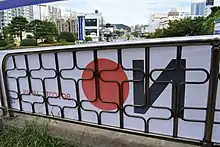2019 boycott of Japanese products in South Korea
In 2019, the boycott of Japanese products and travel began in South Korea due to trade disputes between South Korea and Japan.

History
In 2019, a new wave of boycotts were started in South Korea as a response to the 2019–2020 Japan–South Korea trade dispute. People participating in the movement started not buying Japanese products and services, travelling to Japan, and not watching Japanese-made films.[1][2]
Boycotts of Japanese products and services in South Korea have affected Japanese brands and tourism to Japan. On July 29, 2019, a Korean credit card company reported that credit card sales from Muji fell by 33.4%, ABC Mart sales fell by 11.4% and Daigaku Honyaku Center fell by 55.3%.[3] Uniqlo sales dropped by 40% and the company announced it will close down its Jongno 3-ga store in central Seoul.[4] Similarly, credit card spending from South Koreans in Japan have also declined. JTB Corporation reported that the number of Koreans visiting Japan declined by about 10%.[3] Some South Korean airlines announced they will reduce flights or suspend direct routes between major Japanese and South Korean cities.[5]
The boycott of Japanese products spread into the cultural sector, with the latest release of the Doraemon film series Doraemon: Nobita's Chronicle of the Moon Exploration, which was originally scheduled for release on August 14, had been postponed indefinitely even after the film's Korean dubbing was finished. In July, two other anime films, Butt Detective the Movie and Detective Conan: The Fist of Blue Sapphire, was subjected to unfavourable online reviews on internet and sold only 134,000 and 200,000 tickets respectively.[6][7]
A poll conducted by Realmeter involving 504 adults reveal that, as of July 24, 62.8% of respondents say they are boycotting Japanese goods.[8][9] Another poll conducted by Gallup Korea involving 1,005 adults found that only 12% held favourable views on Japan, while 77% have negative views. Likewise the poll found that 61% of respondents blame the Japanese government for the conflict, while 17% hold the South Korean government responsible.[10]
Background
Forced labor conscription victims Woontaek Yeo and Cheonsu Shin filed an indemnification for damages lawsuit in connection with forced conscription of Japan in the Osaka District Court on December 24, 1997,[11] however, in 2003, they ultimately lost the case in Japan. They demanded compensation and unpaid wages from both the Nippon Steel Corporation and the Japanese government. As a result of the loss in Japan, Woontaek Yeo and three others filed a new indemnification for damages lawsuit against the Nippon Steel Corporation at a Korean court, and on October 30, 2018, the Supreme Court of the Republic of Korea ruled in favor of the Plaintiffs. The victim compensation ruling was the cause of regulations of Japanese exports that went into effect from July 2019, and this sparked a wave of export regulations.
Japan's Response
As a result of the boycott of Japanese products in South Korea, sales of exports of Japanese companies have decreased 99.9% versus the same time last year, and this has caused a serious reduction in revenue of Japanese companies. On the air via an NHK broadcast, the Chief Cabinet Secretary of Japan made an official apology. Diplomatic relations between Korea and Japan have been strained, but the sentiment of South Koreans is that the response of the boycott was prudent.
In regards to the recent spread of Korea-Japan tension, including the conscription victim compensation ruling of the Japanese government, and the strengthening of export regulations, Japan has stated "Korea is in breach of international law," and "export regulations are not related with the conscription ruling at all," and has blamed South Korea.
References
- "South Koreans call for boycott of Japanese cars, beer and cosmetics as 'trade war' intensifies". South China Morning Post. 4 July 2019. Retrieved 28 July 2019.
- "South Koreans are cancelling their Japan trip amid trade war". Travel Daily Media. 23 July 2019.
- Moon-hee, Choi (30 July 2019). "Credit card sales of Japanese Retailers Falling due to Koreans' Boycott of Japanese Goods". Business Korea. Retrieved 7 August 2019.
- Da-sol, Kim (2 August 2019). "Uniqlo records 40 percent drop in sales, closes its Jongno 3-ga store". The Korea Herald. Retrieved 7 August 2019.
- Shao, Grace (31 July 2019). "The escalating dispute between Tokyo and Seoul is already affecting businesses". CNBC. Retrieved 7 August 2019.
- "Anime 'Doraemon' Latest Victim of Japan-South Korea Trade War". The Hollywood Reporter. 4 August 2019.
- "Widening boycott of Japanese goods seeps into culture sector". Yonhap. 5 August 2019.
- "Over 6 in 10 Koreans taking part in boycott of Japanese goods: poll". The Korea Herald. 25 July 2019. Retrieved 7 August 2019.
- "'일제 불매운동' 현재 참여자, 48% → 55% → 63%". Realmeter. 25 July 2019. Retrieved 7 August 2019.
- "Koreans' view of Japan falls to record low: poll". The Korea Times. 12 July 2019. Retrieved 7 August 2019.
- "[Interview] A Japanese supporter of S. Korea's forced labor victims". english.hani.co.kr. Retrieved Jan 5, 2021.